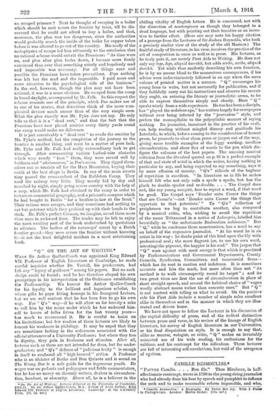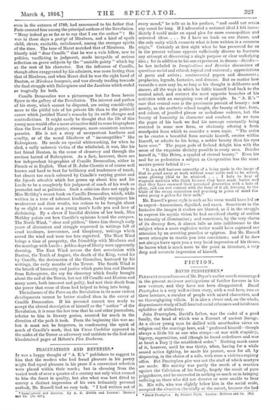CAMTLI,P, DESMOITLINS.$ " ParrvaE Camille. . . . Bon fits."
Thus Mirabeau, in half- affectionate contempt, wrote in 1790 to the young rising journalist, who had already done his best by speech and pamphlet to inflame the mob and to make reasonable reform impossible, and who, • omit& Demnoulins: a Biography. By Violet Met ley. With 5 Plato! in Photogravure. London: Martin Becker. [15s. net.]
even in the autumn of 1789, had announced to his father that Paris counted him among the principal authors of the Revolution. " Many indeed go so far as to say that I am the author " ! He was in those days a prottge of Mirabeau, and a kind of spoilt child, clever, excitable, unbalanced, among the stronger spirits of the time. The tone of Marat matched that of Mirabeau. He bluntly told " dear Camille " that he was a vain fellow, new to politics, vacillating in judgment, made incapable of serious reflection on grave subjects by the " amiable gaiety " which lay at the root of his character. But the influence of Camille, though often exaggerated by his admirers, was more lasting than that of Mirabcau, and when Marat died he was the right hand of Danton, ce 111 irabeau bourgeois, and was already tending towards the final struggle with Robespierre and the Jacobins which ended so tragically for both.
Camille Desmoulins was a picturesque but far from heroic figure in the gallery of the Revolution. The interest and pathos of his story, which cannot be disputed, are owing considerably more to the pitiful tale of his private life than to the political career which justified Marat's remarks by its swift changes and contradictions. It might easily be thought that the life of this young man would offer a more attractive field to some biographers than the lives of his greater, stronger, more consistent contem- poraries. His is not a story of unrepentant hardness and cruelty, or of the moral blindness of " incorruptibles " like Robespierre. He needs no special whitewashing, for when ho died, a sadly unheroic victim of the whirlwind, it was, like his last friend Danton, in the cause of clemency and through the envious hatred of Robespierre. As a fact, however, there are few independent biographies of Camillo Desmoulins, either in French or in English. That of M. Jules Claretie is of course well known and hard to beat for brilliancy and tenderness of touch, but almost too much coloured by Camille's varying genius and tho legende attendrie which has grown up about him and his Lucile to be a completely fair judgment of much of his work as journalist and as politician. Such a criticism does not apply to Miss Methley's recent book on Camille Desmoulins, which, while written in a tone of tolerant kindliness, frankly recognizes his weaknesses and their results, too serious to be brought about by so slight a cause as a young man's facile pen and love of declaiming. By a clever if fanciful division of her book, Miss Methley points out how Camille's opinions boxed the compass. The North Wind, " clear and pitiless," blows him through early years of discontent and struggle expressed in writings full of cruel insolence, irreverence, and blasphemy, writings which sowed the wind and were too late regretted. The West Wind brings a time of prosperity, the friendship with Mirabeau and the marriage with Lucile : golden days of liberty were apparently dawning. The East Wind means the first association with Danton, the Tenth of August, the death of the King, voted for by Camille, the destruction of the Girondins, hastened by his writings, the early months of the Terror. The South Wind is the breath of humanity and justice which parts him and Danton from Robespierre, the cry for clemency which finally brought about the end of the Terror, but not till Camille and Danton and many more, both innocent and guilty, had met their death from the power that some of them had helped to bring into being.
The influence of the Press on the Revolution in its more violent developments cannot be better studied than in the career of Camille Desmoulins. If his personal conceit was ready to accept the absurd description of himself as the " author " of the Revolution, it is none the less true that he and other journalists, inferior to him in literary genius, counted for much in the direction of the path it took. From the beginning this was so: but it must not be forgotten, in condemning the spirit of much of Camille's work, that his Vieux Cordelier appeared in the midst of the Terror as adversary and antidote to the foul and bloodstained pages of Hebert's Pire Duchesne.



































 Previous page
Previous page